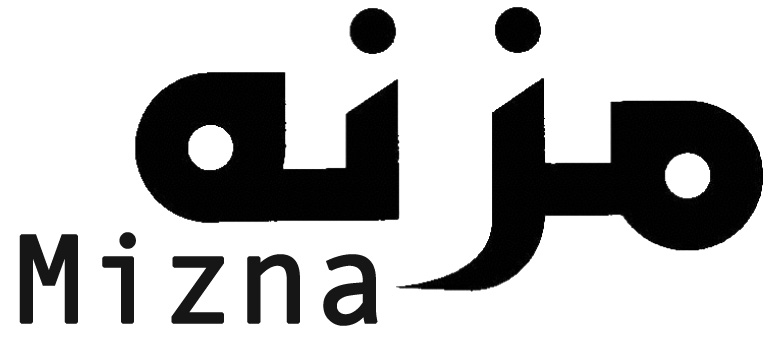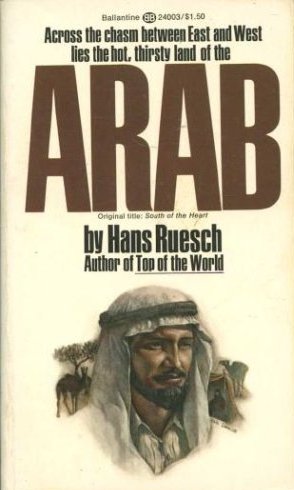For the Love of Film in Doha
 11-26-2012 | tagged
11-26-2012 | tagged  Arab cinema,
Arab cinema,  Arab film,
Arab film,  DTFF,
DTFF,  Doha Film Institute,
Doha Film Institute,  Doha Tribeca Film Festival,
Doha Tribeca Film Festival,  Qatar |
Qatar |  1 Comment |
1 Comment |  Email Article |
Email Article | I have just returned from Doha, having attended the Doha Tribeca Film Festival (DTFF). Energy and enthusiasm suffused the city, which seemed to have been wrapped in its celebration of film.
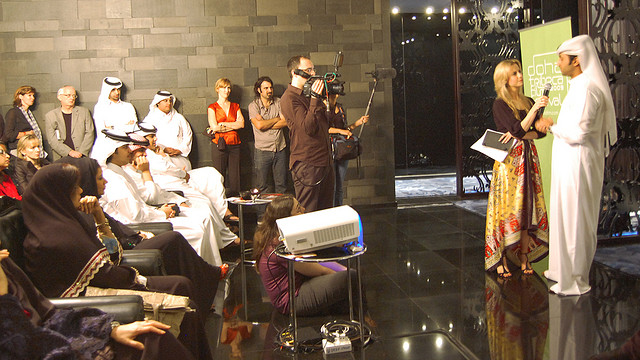 Photo credit: Doha Film Institute
Photo credit: Doha Film Institute
Of course, I expected the abundantly funded festival to exude lavishness and glamor, but what I didn’t expect and what has driven me to post a day after my return is the community engagement, which manifested in ways that surprised and delighted me.
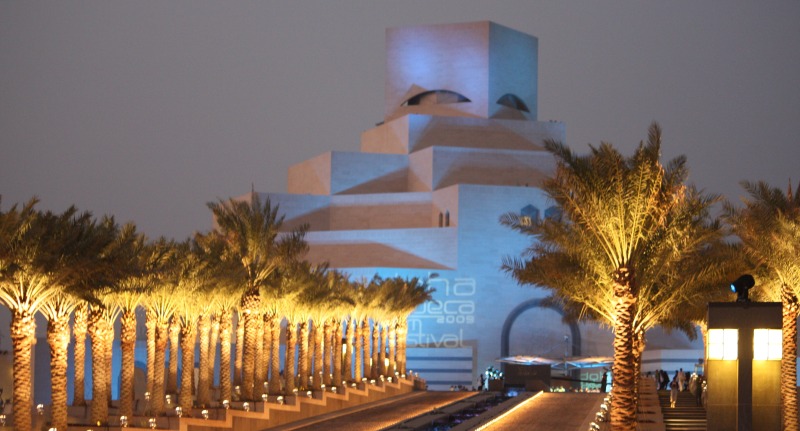 Museum of Islamic Art. Photo credit: riy
Museum of Islamic Art. Photo credit: riy
This year’s edition was held in three locations: the Museum of Islamic Art, an architectural marvel I unfortunately did not have the time to visit; Katara cultural village, which houses the Doha Film Institute, the organization behind DTFF; and Souq Waqef, a century-old shopping district that has recently been restored and expanded to include restaurants and fashionable boutique hotels wherein the festival guests stayed. Yet, physical signifiers of the festival—signs, posters, and billboards, some enormous—were strategically positioned throughout the capital city.
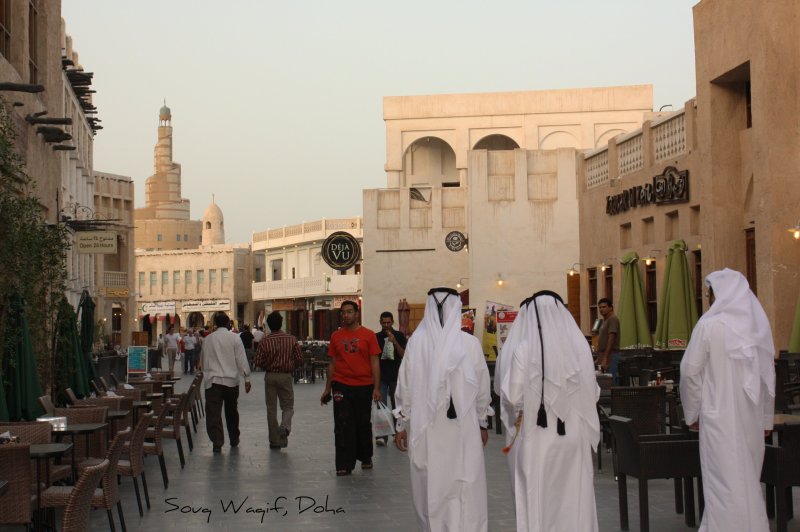 Souq Waqef. Photo credit: Jan Smith
Souq Waqef. Photo credit: Jan Smith
The festival boasted much that I’ve encountered in other festivals: film screenings, Q&A sessions with filmmakers, panel discussions, workshops, award ceremonies, red carpet events, and, of course, parties. What really impressed me, however, was the engagement of youth in the festival. Beside supporting and celebrating many young local filmmakers in the “Made in Qatar” competition, the festival presented Family Days, a four-day program of family focused events aiming not only to expose kids to art, including film, but also to have them participate in creative workshops, including photography and filmmaking. All non-screening Family Days programs were free of charge. Family Days also presented free screenings of two wonderful films which long ago had me in memorable weeping sessions--E.T. and Cinema Paradiso--both of which were screened in the stupendous, beachside Sony Open-Air Cinema within Katara.
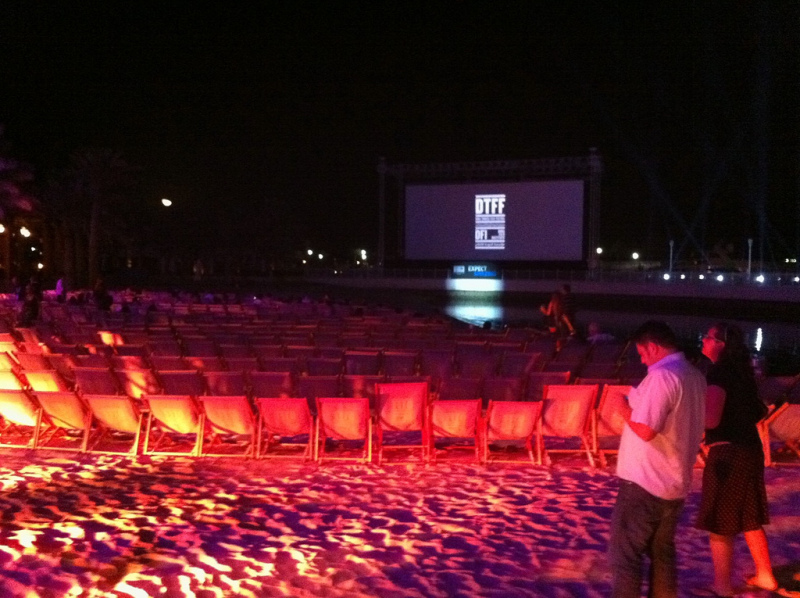 Sony Open-Air Cinema. Photo credit: Ayman Itani
Sony Open-Air Cinema. Photo credit: Ayman Itani
The festival cultivated a youth reporter core, dubbed the DFI Kids Access Reporting Team, which covered red carpet events, proudly displaying their press badges as they interviewed guests then reporting on such events on the festival website—charming!
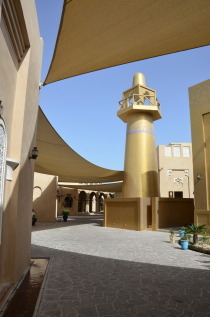 Katara. Photo credit: Karen Blumberg Ultimately, it was my encounters with young DTFF volunteers and guest service providers that left the deepest impression. One morning, I was heading to Katara for a meeting and thought to catch the festival shuttle bus. As I boarded, I asked the driver about going there and was told that it would take an hour. “That’s too long,” I responded, before turning to see a teenage boy, in festival T-shirt and badge, who had followed with “That’s too late for me too.” The transportation coordinator at this station (like most, in his early twenties), upon checking my credentials, availed me a car within the festival’s transportation fleet. When the car arrived, I asked the transportation coordinator if it would be OK if the teen came along, which he appreciated, as did my new companion.
Katara. Photo credit: Karen Blumberg Ultimately, it was my encounters with young DTFF volunteers and guest service providers that left the deepest impression. One morning, I was heading to Katara for a meeting and thought to catch the festival shuttle bus. As I boarded, I asked the driver about going there and was told that it would take an hour. “That’s too long,” I responded, before turning to see a teenage boy, in festival T-shirt and badge, who had followed with “That’s too late for me too.” The transportation coordinator at this station (like most, in his early twenties), upon checking my credentials, availed me a car within the festival’s transportation fleet. When the car arrived, I asked the transportation coordinator if it would be OK if the teen came along, which he appreciated, as did my new companion.
On the way, I asked my companion what he was doing for the festival. I could sense the enthusiasm in his voice as he conveyed that he was in a hurry to get to Katara because he was volunteering in a Family Days event.
Next day, after spending a couple of hours watching films in a room designated for press viewing, at independent stations, of films exhibited in the festival, I walked over to the room supervisor, a woman in her early twenties. I handed her back the DVD of Rafea: Solar Mama as I poured praise over the irresistible documentary film, to which she said that she hadn’t seen it, but that she thought the winner of the Best Documentary Filmmaker Award In the Shadow of a Man was a really special, moving film. She then emphatically encouraged me to see it when I had the chance. She wasn’t just checking out DVDs; she was a film enthusiast.
And she wasn’t the only twenty-something female film enthusiast that I encountered in the Doha Tribeca Film Festival. Indeed, nothing has warmed my heart in attending DTFF more than this evident vitality among young people involved in one capacity or another in the festival. I was readily convinced that the Doha Film Institute was earnest and determined in its proclamation that it aimed to fashion a community centered international film festival. Many large events claim to be community based, few have struck me as such as much as DTFF—well done.
